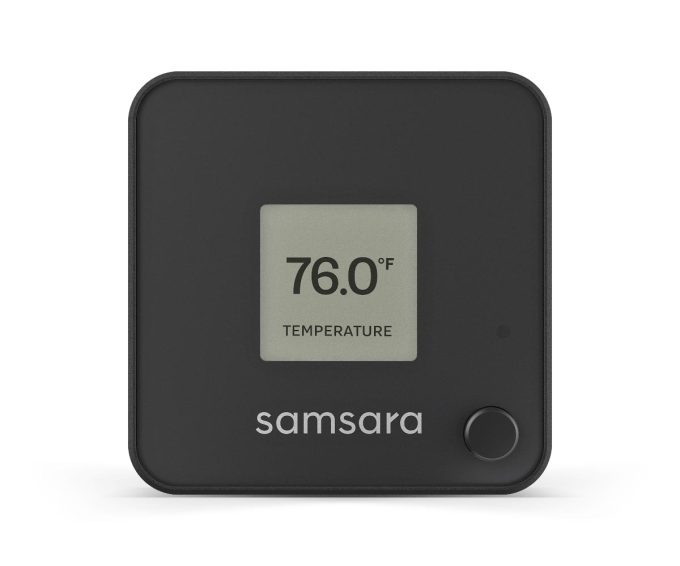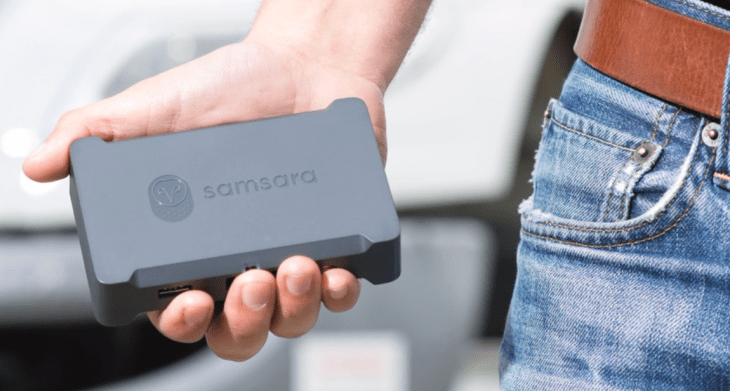Rapid changes in the shipping industry has caught the attention of investors who are starting to pour large sums of money into the industry. And likely for good reason: as a future where trucks are run autonomously becomes ever clearer, the sensors and software behind that is going to have to be able to keep up.
One company, Samsara, is working on just those kinds of sensors and products to keep those fleets operating smoothly. The startup creates GPS trackers and sensors — such as ones that track temperature — and feeds back that data to fleet managers to make sure everything is running well. Samsara today said it has raised $40 million in financing at a round that values the company at more than $530 million. The round was led by General Catalyst, with Andreessen Horowitz participating. As part of this round, General Catalyst’s Hemant Taneja will be joining the company’s board.
While they operate well with fleets today, it’s likely that the same kinds of sensors could find their way into other kinds of situations as well — such as factories and anything that requires tracking real-world data to improve efficiency. CEO Sanjit Biswas said he had served with Taneja on a board together, which would eventually lead down the road to a financing round led by General Catalyst. Most of the questions were around how the company would actually sell into these kinds of markets, which is where the big focus on a plug-and-play approach came, Biswas said.

Each truck or car that breaks down can stall a company’s business, especially as customers demand shorter and shorter shipping times. But it also means that an opportunity has opened up for startups that can produce specialty sensors and tools for companies that already have massive fleets but need to improve their efficiency. Dash cams, temperature sensors and trackers for the various problem points in a car or truck can make sure companies catch problems before they start, much in the same way that sensors are increasingly finding themselves in manufacturing settings.
“We are definitely excited about the way the logistics market is moving overall.” Biswas said. “Companies like Flexport are responding to customers’ desire to gain better insight into where their inventory is at all times, at a massive scale. Our plans are to provide the underlying connected sensor hardware and software that would enable companies like Flexport to offer features like real-time tracking of cargo, historical sensor readings of environmental conditions and even video of the journey to their customers in the future.”
Producing sensors that go into fleets — and in the future more markets — that are already in use isn’t even just an enterprise problem. There are startups like Pearl Automation, which turns your license plate into a rear-view camera. It’s a different principle, but it shows how much money investors are pouring into technology that customers can bolt onto their existing equipment (or cars, in this case) to make them run more efficiently. (Pearl has raised $50 million.)
Still, even as the world starts to march toward autonomous driving, it’s clear that there is a lot of work to do. Biswas says the company is complementary to an autonomous driving future, since it’s geared more toward business intelligence than the actual driving technology. And as more and more autonomous cars get on the road, that means more sensors — and more data for Samsara. That’s part of the reason why Samsara’s sensors and tools are designed to be installed easily, and also has ways to ensure compliance with local regulations for drivers.
Samsara’s challenge will be to go up against existing sensor providers like Honeywell and Fleetmatics, as well as other startups that may try to pick at the smaller and more specialized parts of sensor technology. Biswas says it hopes to do that by providing a more comprehensive suite of products that wraps into a single layer of software.
Samsara is run by Biswas and John Bicket, who previously sold enterprise wi-fi startup Meraki to Cisco for $1.2 billion. The company has raised $80 million in total.
